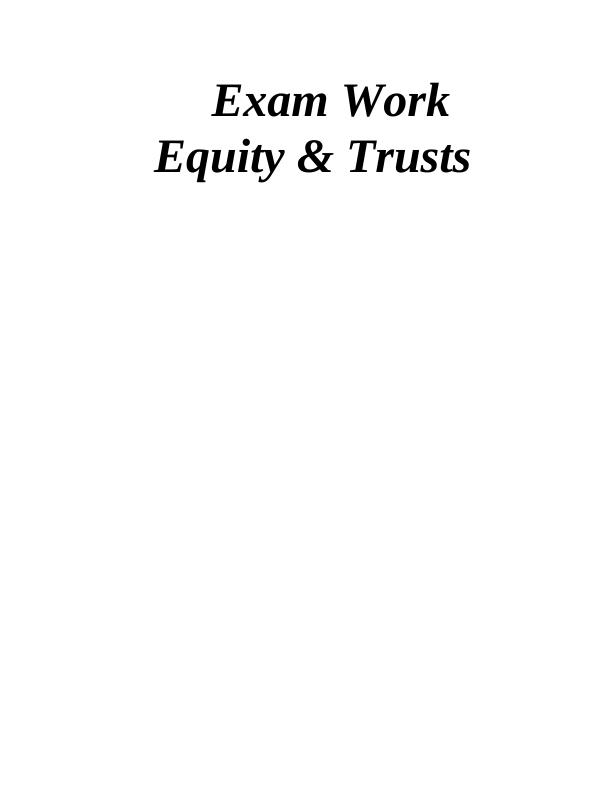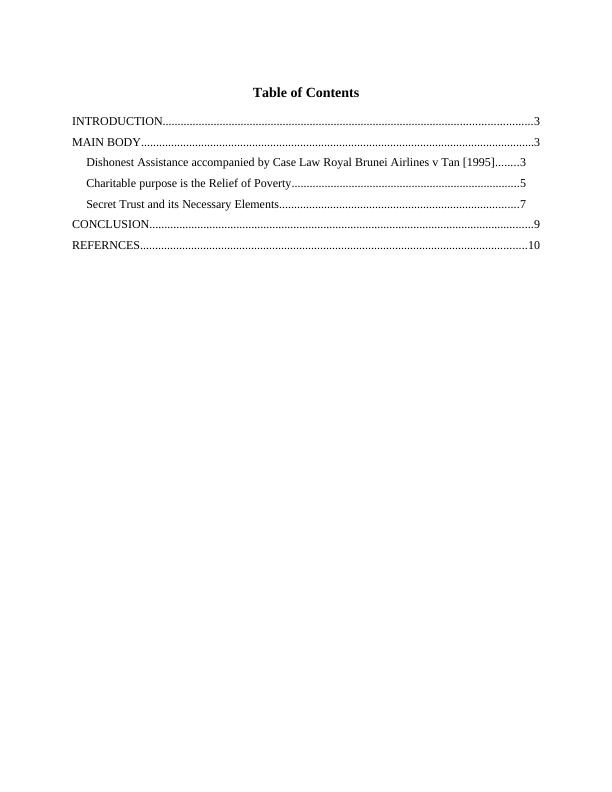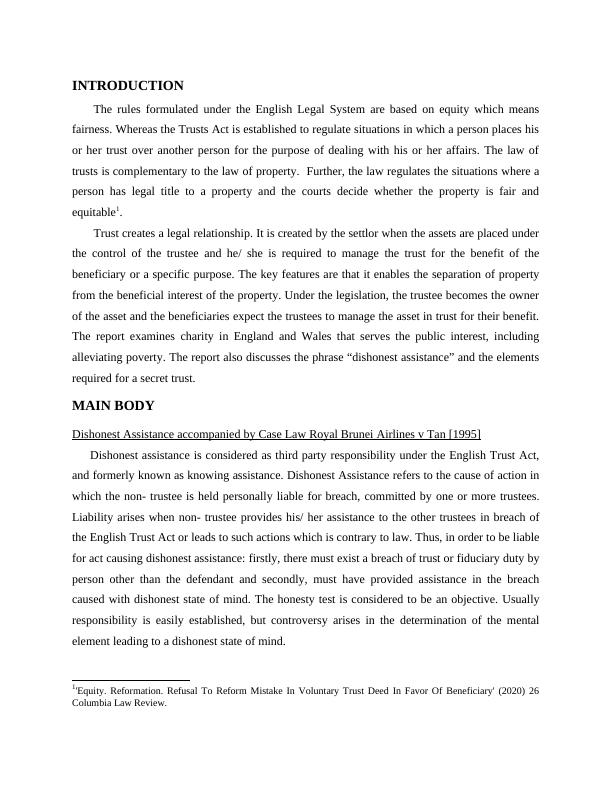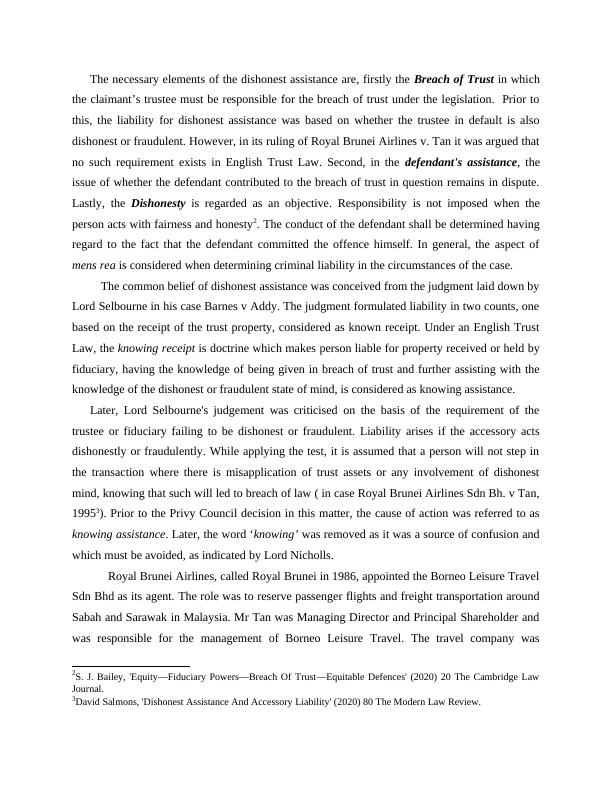Equity & Trusts: Dishonest Assistance, Relief of Poverty, Secret Trust
Added on 2022-12-01
11 Pages3689 Words406 Views
Exam Work
Equity & Trusts
Equity & Trusts

Table of Contents
INTRODUCTION...........................................................................................................................3
MAIN BODY...................................................................................................................................3
Dishonest Assistance accompanied by Case Law Royal Brunei Airlines v Tan [1995]........3
Charitable purpose is the Relief of Poverty............................................................................5
Secret Trust and its Necessary Elements................................................................................7
CONCLUSION................................................................................................................................9
REFERNCES.................................................................................................................................10
INTRODUCTION...........................................................................................................................3
MAIN BODY...................................................................................................................................3
Dishonest Assistance accompanied by Case Law Royal Brunei Airlines v Tan [1995]........3
Charitable purpose is the Relief of Poverty............................................................................5
Secret Trust and its Necessary Elements................................................................................7
CONCLUSION................................................................................................................................9
REFERNCES.................................................................................................................................10

INTRODUCTION
The rules formulated under the English Legal System are based on equity which means
fairness. Whereas the Trusts Act is established to regulate situations in which a person places his
or her trust over another person for the purpose of dealing with his or her affairs. The law of
trusts is complementary to the law of property. Further, the law regulates the situations where a
person has legal title to a property and the courts decide whether the property is fair and
equitable1.
Trust creates a legal relationship. It is created by the settlor when the assets are placed under
the control of the trustee and he/ she is required to manage the trust for the benefit of the
beneficiary or a specific purpose. The key features are that it enables the separation of property
from the beneficial interest of the property. Under the legislation, the trustee becomes the owner
of the asset and the beneficiaries expect the trustees to manage the asset in trust for their benefit.
The report examines charity in England and Wales that serves the public interest, including
alleviating poverty. The report also discusses the phrase “dishonest assistance” and the elements
required for a secret trust.
MAIN BODY
Dishonest Assistance accompanied by Case Law Royal Brunei Airlines v Tan [1995]
Dishonest assistance is considered as third party responsibility under the English Trust Act,
and formerly known as knowing assistance. Dishonest Assistance refers to the cause of action in
which the non- trustee is held personally liable for breach, committed by one or more trustees.
Liability arises when non- trustee provides his/ her assistance to the other trustees in breach of
the English Trust Act or leads to such actions which is contrary to law. Thus, in order to be liable
for act causing dishonest assistance: firstly, there must exist a breach of trust or fiduciary duty by
person other than the defendant and secondly, must have provided assistance in the breach
caused with dishonest state of mind. The honesty test is considered to be an objective. Usually
responsibility is easily established, but controversy arises in the determination of the mental
element leading to a dishonest state of mind.
1'Equity. Reformation. Refusal To Reform Mistake In Voluntary Trust Deed In Favor Of Beneficiary' (2020) 26
Columbia Law Review.
The rules formulated under the English Legal System are based on equity which means
fairness. Whereas the Trusts Act is established to regulate situations in which a person places his
or her trust over another person for the purpose of dealing with his or her affairs. The law of
trusts is complementary to the law of property. Further, the law regulates the situations where a
person has legal title to a property and the courts decide whether the property is fair and
equitable1.
Trust creates a legal relationship. It is created by the settlor when the assets are placed under
the control of the trustee and he/ she is required to manage the trust for the benefit of the
beneficiary or a specific purpose. The key features are that it enables the separation of property
from the beneficial interest of the property. Under the legislation, the trustee becomes the owner
of the asset and the beneficiaries expect the trustees to manage the asset in trust for their benefit.
The report examines charity in England and Wales that serves the public interest, including
alleviating poverty. The report also discusses the phrase “dishonest assistance” and the elements
required for a secret trust.
MAIN BODY
Dishonest Assistance accompanied by Case Law Royal Brunei Airlines v Tan [1995]
Dishonest assistance is considered as third party responsibility under the English Trust Act,
and formerly known as knowing assistance. Dishonest Assistance refers to the cause of action in
which the non- trustee is held personally liable for breach, committed by one or more trustees.
Liability arises when non- trustee provides his/ her assistance to the other trustees in breach of
the English Trust Act or leads to such actions which is contrary to law. Thus, in order to be liable
for act causing dishonest assistance: firstly, there must exist a breach of trust or fiduciary duty by
person other than the defendant and secondly, must have provided assistance in the breach
caused with dishonest state of mind. The honesty test is considered to be an objective. Usually
responsibility is easily established, but controversy arises in the determination of the mental
element leading to a dishonest state of mind.
1'Equity. Reformation. Refusal To Reform Mistake In Voluntary Trust Deed In Favor Of Beneficiary' (2020) 26
Columbia Law Review.

The necessary elements of the dishonest assistance are, firstly the Breach of Trust in which
the claimant’s trustee must be responsible for the breach of trust under the legislation. Prior to
this, the liability for dishonest assistance was based on whether the trustee in default is also
dishonest or fraudulent. However, in its ruling of Royal Brunei Airlines v. Tan it was argued that
no such requirement exists in English Trust Law. Second, in the defendant's assistance, the
issue of whether the defendant contributed to the breach of trust in question remains in dispute.
Lastly, the Dishonesty is regarded as an objective. Responsibility is not imposed when the
person acts with fairness and honesty2. The conduct of the defendant shall be determined having
regard to the fact that the defendant committed the offence himself. In general, the aspect of
mens rea is considered when determining criminal liability in the circumstances of the case.
The common belief of dishonest assistance was conceived from the judgment laid down by
Lord Selbourne in his case Barnes v Addy. The judgment formulated liability in two counts, one
based on the receipt of the trust property, considered as known receipt. Under an English Trust
Law, the knowing receipt is doctrine which makes person liable for property received or held by
fiduciary, having the knowledge of being given in breach of trust and further assisting with the
knowledge of the dishonest or fraudulent state of mind, is considered as knowing assistance.
Later, Lord Selbourne's judgement was criticised on the basis of the requirement of the
trustee or fiduciary failing to be dishonest or fraudulent. Liability arises if the accessory acts
dishonestly or fraudulently. While applying the test, it is assumed that a person will not step in
the transaction where there is misapplication of trust assets or any involvement of dishonest
mind, knowing that such will led to breach of law ( in case Royal Brunei Airlines Sdn Bh. v Tan,
19953). Prior to the Privy Council decision in this matter, the cause of action was referred to as
knowing assistance. Later, the word ‘knowing’ was removed as it was a source of confusion and
which must be avoided, as indicated by Lord Nicholls.
Royal Brunei Airlines, called Royal Brunei in 1986, appointed the Borneo Leisure Travel
Sdn Bhd as its agent. The role was to reserve passenger flights and freight transportation around
Sabah and Sarawak in Malaysia. Mr Tan was Managing Director and Principal Shareholder and
was responsible for the management of Borneo Leisure Travel. The travel company was
2S. J. Bailey, 'Equity—Fiduciary Powers—Breach Of Trust—Equitable Defences' (2020) 20 The Cambridge Law
Journal.
3David Salmons, 'Dishonest Assistance And Accessory Liability' (2020) 80 The Modern Law Review.
the claimant’s trustee must be responsible for the breach of trust under the legislation. Prior to
this, the liability for dishonest assistance was based on whether the trustee in default is also
dishonest or fraudulent. However, in its ruling of Royal Brunei Airlines v. Tan it was argued that
no such requirement exists in English Trust Law. Second, in the defendant's assistance, the
issue of whether the defendant contributed to the breach of trust in question remains in dispute.
Lastly, the Dishonesty is regarded as an objective. Responsibility is not imposed when the
person acts with fairness and honesty2. The conduct of the defendant shall be determined having
regard to the fact that the defendant committed the offence himself. In general, the aspect of
mens rea is considered when determining criminal liability in the circumstances of the case.
The common belief of dishonest assistance was conceived from the judgment laid down by
Lord Selbourne in his case Barnes v Addy. The judgment formulated liability in two counts, one
based on the receipt of the trust property, considered as known receipt. Under an English Trust
Law, the knowing receipt is doctrine which makes person liable for property received or held by
fiduciary, having the knowledge of being given in breach of trust and further assisting with the
knowledge of the dishonest or fraudulent state of mind, is considered as knowing assistance.
Later, Lord Selbourne's judgement was criticised on the basis of the requirement of the
trustee or fiduciary failing to be dishonest or fraudulent. Liability arises if the accessory acts
dishonestly or fraudulently. While applying the test, it is assumed that a person will not step in
the transaction where there is misapplication of trust assets or any involvement of dishonest
mind, knowing that such will led to breach of law ( in case Royal Brunei Airlines Sdn Bh. v Tan,
19953). Prior to the Privy Council decision in this matter, the cause of action was referred to as
knowing assistance. Later, the word ‘knowing’ was removed as it was a source of confusion and
which must be avoided, as indicated by Lord Nicholls.
Royal Brunei Airlines, called Royal Brunei in 1986, appointed the Borneo Leisure Travel
Sdn Bhd as its agent. The role was to reserve passenger flights and freight transportation around
Sabah and Sarawak in Malaysia. Mr Tan was Managing Director and Principal Shareholder and
was responsible for the management of Borneo Leisure Travel. The travel company was
2S. J. Bailey, 'Equity—Fiduciary Powers—Breach Of Trust—Equitable Defences' (2020) 20 The Cambridge Law
Journal.
3David Salmons, 'Dishonest Assistance And Accessory Liability' (2020) 80 The Modern Law Review.

End of preview
Want to access all the pages? Upload your documents or become a member.
Related Documents
Equity and Law of Trustslg...
|11
|3856
|268
Equity & Trusts Law: Paul v Constance, Keech v Sandford, Dishonest Assistancelg...
|10
|3242
|274
ASSIGNMENT ON ANALYSIS OF DISHONEST ASSISTANCE.lg...
|9
|2395
|10
Breach of Trust; Defenceslg...
|10
|3404
|91
Case Study Analysis on Express Trust and Agency Lawlg...
|8
|1851
|252
Equity and Trust Law: Claims Against Parties, Breach of Duty, and Remedies Availablelg...
|10
|2978
|121
